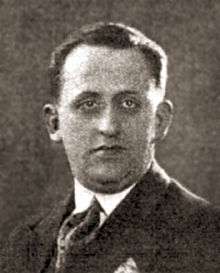Jakub Kagan
| Jakub Kagan | |
|---|---|
|
Kagan in Warsaw | |
| Born |
7 February 1896 Nowogródek |
| Died |
1942 (aged 45–46) Warsaw Ghetto |
| Nationality | Polish |
| Ethnicity | Jewish |
| Occupation | Pianist, jazz musician, arranger |
| Known for | Popular prewar composer |
Jakub Kagan (7 February 1896 – 1942) was a popular Polish-Jewish composer, pianist, jazz musician and arranger. In the early 1920s, he formed the Kagan's Jazz Band in Warsaw, performing in operettas, cabarets, and hotels. Since 1922 Kagan was a feature artist at the Kabaret Mirage and at the Teatr Nowości. In 1926 he signed a contract with the luxury Hotel Bristol in Warsaw. His band performed world-renowned standards as well as his own compositions widely popular across the country. He died in Warsaw during the Holocaust in occupied Poland.[1]
Life
Kagan was one of four sons of Morduch (Mordechai) and Sara née Kantor. He was born in Nowogródek (now Navahrudak in Belarus). His eldest brother Mieczysław (born in 1887) changed his name to Kochanowski and became composer of dance music before the First World War. Jakub followed in his brother's footsteps.[2] He graduated from the Warsaw Institute of Music before 1918 and became member of the Polish Composers Union. In 1920 he fought in the Polish–Soviet War defending Warsaw during the Battle of Radzymin. He began composing at that particular time. His first widely popular tango was "Złota pantera" (The Gold Panther) to words by Andrzej Włast (1895–1942), premiered in 1929 in Żegiestów. The song opened all the doors for his subsequent Warsaw career, followed by international tours and concerts in Germany, Austria, and Hungary.[1] His greatest hits were performed by such headliners as Hanka Ordonówna, Adam Aston, and Stanisław Grzesiuk.[3]
After the invasion of Poland by Nazi Germany he was deported to the Warsaw Ghetto where he played piano at the Splendid Café and the Melody Palace Theatre to survive. He was killed in 1942 possibly during the murderous Grossaktion Warsaw.[1] His other brother, Feliks, who had changed his name to Kochański, also perished during the war.[4] Only the youngest of the Kagan brothers, Alexander (born in 1906), survived the Holocaust as a soldier of the Polish Army in France (1939–40), interned in Switzerland.[2]
Popular songs
|
|
References
- 1 2 3 B.P.P. (2009). "Kagan, Jakub". Biografia. Cyfrowa Biblioteka Polskiej Piosenki. With selected bibliography. Retrieved 5 June 2015.
- 1 2 Dr. Katarzyna Naliwajek-Mazurek (2010). "Polish Composers in German Occupied Poland". Composers suppressed by the Nazis. University of Warsaw, Institute of Musicology: The OREL Foundation. Retrieved 7 June 2015.
- ↑ Index (2015). "Jakub Kagan: Discography". Writing & Arrangement. Recording studios & Catalog numbers. discogs. Retrieved 7 June 2015.
- ↑ Naliwajek-Mazurek 2010 (ibidem), Note: see Tomasz Lerski, Syrena Record. Pierwsza polska wytwórnia fonograficzna 1904–1939, Editions ”Karin”, New York – Warsaw 2004: 661–662.
- ↑ Jakub Kagan, "Musiałem cię zostawić" (Had to Leave You, 1937), performed by Bob & Harris on YouTube
- ↑ Jakub Kagan, "Złota pantera" (The Gold Panther, 1929), performed by Tadeusz Faliszewski on YouTube
- ↑ Jakub Kagan, "Miłość stara jak świat" (Love As Old As Time, 1933), performed by Adam Aston on YouTube
- ↑ Jakub Kagan, "Zakochany księżyc" (The Moon In Love, 1938), performed by A. Harris on YouTube
- 1 2 3 4 5 6 7 8 9 S.M. (2015). "Old Melodies, Composer: Jakub Kagan. Index". Pages with full lyrics in the Polish language. Background info. Links to recordings featured at YouTube. Stare Melodie.pl. Retrieved 7 June 2015.
Bibliography
- Stanisław Łoza (ed.), "Czy wiesz kto to jest?", Wydawnictwo Głównej Księgarni Wojskowej Warszawa 1938, p. 312.
|
